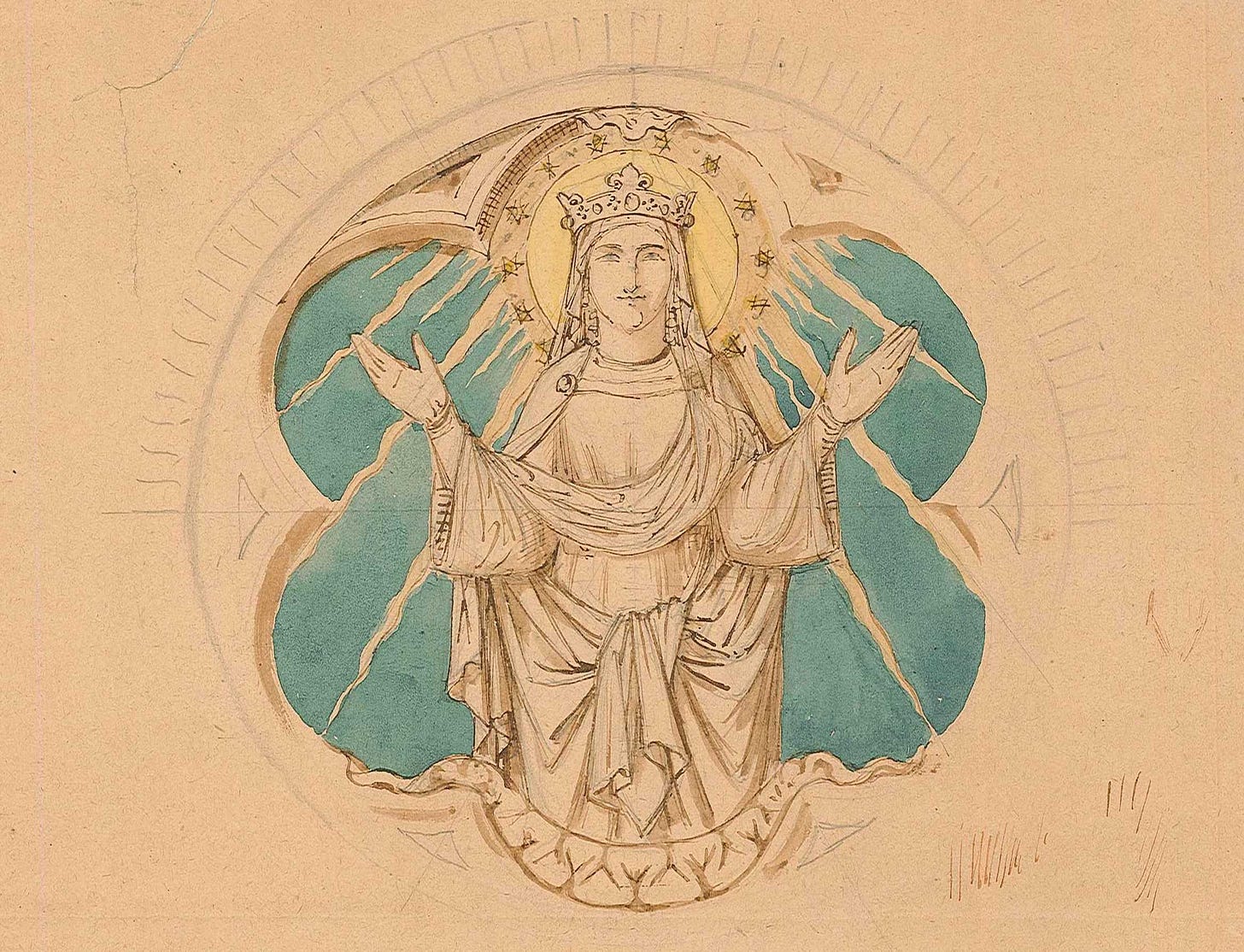Why We Can Say the Blessed Virgin Mary Is the Mediatrix of All Grace and the Co-Redemptrix
These doctrinal truths ought to be defended by all, but there are reasons not to define them as dogmas at this time
Today’s post will consist of two parts and an appendix. First, I will demonstrate that it is fitting to venerate the Blessed Virgin Mary as “Mediatrix of All Graces.” Second, I will share a sermon by Fr. Matthew McCarthy, FSSP, which is one of the best succinct treatments of Our Lady as “Co-Redemptrix.” Together, these two parts establish that there is the same basis for proclaiming these Marian dogmas as there is for having proclaimed the Divine Motherhood, the Perpetual Virginity, the Immaculate Conception, and the Assumption.
An Appendix will share the texts of the Mass approved in 1921 by Pope Benedict XV in honor of Our Lady, Mediatrix of All Graces, showing that these truths are expressed in the Church’s “lex orandi.” The Appendix concludes with recommended Further Reading. —PAK

PART 1: Mary as Mediatrix
It is not perhaps surprising that Protestants misunderstand Catholic teaching on Our Blessed Mother. It is quite a bit more troubling when Catholics do not understand it! My goal here is to explain and defend what we mean when we acknowledge the Blessed Virgin to be “the Mediatrix of All Graces.” We will show how Mary’s God-given role not only does not conflict with the unique salvific mediation of her Son, but emphatically presupposes and reinforces it. This should remove any valid Protestant objection to the title, and, for Catholics, any hesitation about affirming it.
In good Thomistic fashion, let us begin with an objection: “There is . . . one mediator of God and man, the man Christ Jesus” (1 Tim 2:5). As St. Thomas Aquinas explains:
The office of a mediator is to join together and unite those between whom he mediates: for extremes are united in the mean [medio, the one in the middle]. Now to unite men to God in the perfect way belongs to Christ, through Whom men are reconciled to God, according to 2 Corinthians 5:19: “God was in Christ reconciling the world to Himself.” And, consequently, Christ alone is the perfect Mediator of God and men, inasmuch as, by His death, He reconciled the human race to God. Hence the Apostle, after saying, “Mediator of God and man, the man Christ Jesus,” added: “Who gave Himself as a redemption for all.”1
By His life and death, Christ won for us all the graces and merits necessary for our salvation. The winning and distributing of these merits is the mediation that Jesus Christ performs between the Holy Trinity and mankind. Jesus gained these merits during His earthly mission and is worthy to distribute them from His heavenly throne.
All merits He gained are of the kind that belongs to an act worthy of a reward in strict justice, as a salary is due to a worker who does his job. Gaining such merit is unique to Christ, since, being divine, His acts were infinitely worthy. The smallest act of Jesus was perfectly pleasing to the Father, for it proceeded from a perfect love. Much more, then, was the greatest act of Jesus, His death on the Cross, pleasing and able to win all graces for all times. As Head of the whole human race, our Lord can distribute His graces and merits to all men and women whom He wills to unite to Himself.
The uniqueness of Christ’s mediation, in this sense, has always been affirmed by Christian theologians: “there is no other name under heaven given among men by which we must be saved” (Acts 4:12). (Evidently St. Luke did not believe that all religions were “paths to God,” like so many languages, and that they all partake of “divine inspiration” — but let’s not digress.)
Keep reading with a 7-day free trial
Subscribe to Tradition and Sanity to keep reading this post and get 7 days of free access to the full post archives.


